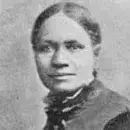
Frances Ellen Watkins Harper
Frances Ellen Watkins Harper was a prominent African American abolitionist, suffragist, social reformer, and writer in nineteenth-century America, who cofounded the National Association of Colored Women’s Clubs. Her first volume of verse, Forest Leaves, also published as Autumn Leaves, appeared in 1845 when she was twenty years old. In 1859, her story “The Two Offers” was published in The Anglo-African Newspaper, making her the first Black woman to publish a short story in the United States.
Born in Baltimore, the only child of free African American parents, Harper was educated at her uncle’s Academy for Negro Youth, and found domestic work in a Quaker household, where she had access to a wide range of literature. After teaching for two years in Ohio and Pennsylvania, she embarked on a career as a traveling speaker on the abolitionist circuit. In 1854 in New Bedford, Massachusetts, Harper delivered a public address on “Education and the Elevation of the Colored Race.” Her success there led to a two-year lecture tour in Maine for the state Anti-Slavery Society, and from 1856 to 1860 she spoke throughout the East and Midwest. She helped slaves escape through the Underground Railroad, wrote frequently for antislavery newspapers, and helped shape early African American journalism.
A prolific writer, Harper published many collections of poetry, including Forest Leaves (or Autumn Leaves, 1845); Poems on Miscellaneous Subjects (1854); Sketches of Southern Life (1872); The Martyr of Alabama and Other Poems (1892); The Sparrow’s Fall and Other Poems (1894); and Atlanta Offering (1895). Harper also published several novels, notably Iola Leroy or Shadows Uplifted (1892), and essay collections.
In addition to her antislavery lecturing, she read frequently from her book, Poems on Miscellaneous Subjects, which addressed the subjects of motherhood, separation, and death and included the antislavery poem “Bury Me in a Free Land.” During Reconstruction she was an activist for civil rights, women’s rights, and educational opportunities for all. Harper spent the rest of her career working for equal rights, job opportunities, and education for African American women.